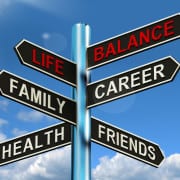Engagement: Another name for work/life balance?
Regular readers of this blog know that I’m a proponent of finding work/life balance AND a proponent of excellent client service. Though others may disagree, I think the two can and must co-exist, and frankly I question whether a lawyer can deliver top-notch legal services without some form of balance — recognizing that “balance” means radically different things to different people.
But “work/life balance” tends to take a beating at times. Some attorneys and some commentators think that work/life balance is a PC phrase for lazy lawyers. And I’ve been recently mulling over another way of expressing WLB ideas such as having a life outside practice, creating time and habits that support both practice and personal life, and using energy boosts from recreation to buoy the focus and output required by practice.
Peter Vajda recently commented on “engagement,” which he went on to describe as “the experience of an employee who is fully involved in, and enthusiastic about, his or her work. Folks who are ‘engaged’ proactively care about the future of their organization and are most often willing to invest, over and above, to ensure their organization’s success.” Well said, Peter.
That thought dovetails with a book I finished reading over the weekend called The Power of Full Engagement. I’ve recommended the book before based on a preliminary skim, but now that I’ve read it all the way through, it’s going on my “highly recommended resource” list for clients. Its premise is that most of us move through our careers as if we’re marathon runners, working from stress to stress with little or no time for recovery — and that doesn’t turn out so well. Instead, the authors recommend periods of strategic disengagement from work to facilitate regeneration, and that disengagement from work is generally engagement in some personal pursuit, whether that’s family time or an artistic hobby. In other words, it’s what I’d call work/life balance in motion, the attribute of being a person who is a lawyer rather than a lawyer who also does XYZ on the side.
So, perhaps we should be talking about how lawyers can become more fully engaged in their practices and lives? Readers, I’m curious: does the concept of “full engagement” resonate with you more than the idea of “work/life balance”?




I like the word “engagement.” I am wondering what you think about this quote from James Allen:
“True economy is the middle way in all things, whether material or mental, between waste and undue retention. That which is wasted, whether money or mental energy, is rendered powerless; that which is selfishly retained and hoarded up is equally powerless.
“An all-round economy consists in finding the middle way in the following seven things: Money, Food, Clothing, Recreation, Rest, Time, and Energy.”
From http://westallen.typepad.com/idealawg/2007/03/timeless_client.html
Interesting post.
I like the word “engagement” too, but it sounds like it is referring primarily, if not entirely to work. I’m in favor of sticking with the Work/Life Balance phraseology. Maybe it is a good thing that WLB is a bit of a lightning rod for criticism . . . I mean, if lawyers interpret the word “balance” to mean “lazy” — that’s pretty good evidence of how much work there is to be done on this front.
Stephanie, thanks for your comment, which alerted me to your blog series on Allen’s Eight Pillars. I think it’s terrific advice, though very challenging for us (me, at least) to follow. Moderation in all things is good; it’s also a tough standard to reach.
I’ll enjoy visiting your blog and reading more!
Erik, thanks for your comment! I agree that there’s an air about engagement that makes it work-centered… But I wonder whether that’s necessary.
As for the lightning rod, yes, that can come in handy. What I’m wondering (and have not yet decided) is whether it would be more beneficial to use a word that doesn’t have quite the same negative connotation attached to it, in an effort to reach people before they’ve prejudged the issue just because of what we’re calling it.
I also think that work/life balance suggests that there should be a truly equal balance between work and life, and that “balance” is something that we either do or don’t have. That creates a misimpression in my book, since I believe that balance is a process rather than a state and that it likely will look very different for different people.
Semantics? Or a valid point? That’s what I’m debating.
I feel “balance” is more about “be-ing” than “do-ing”, that balance points to an emotional-mental-physical-spiritual equiulibrium- a place from where we make self-suporting choices about how we choose to conduct our lives. Being “out of balance”, for me, means making unhealthy, self-defeating choices about life and living at work, at home and at play, not about dividing up the minutes, hours, days, etc. It’s about the quality of our relationship to work, to spouses and partners, to money, to play, etc., and about the choices we make that support or limit the quality of the time spent in doing what we choose to do.
I’ve just finished reading a book on employee engagement, “12 The Elements of Great Managing” by Rodd Wagner and James K. Harter, Ph.D. Gallup Press 2006. I found it completely applicable to law firms. Managing partners should read it twice. Once as they are inclined, defensive and in denial that the concepts are inapplicable or crazy. Then a second time after a week of walking around the office strangely noticing many of the things the book identifies as ultimately unprofitable.